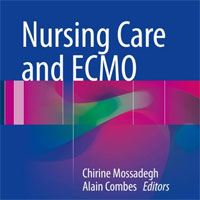Tag: study

Assessment of Patiromer Monotherapy for Hyperkalemia in an Acute Care Setting
In this cohort study of patients with acute, non–life-threatening hyperkalemia, a single dose of patiromer was associated with a significant decrease in serum potassium levels and a low incidence of hypokalemia. These... read more

COVID-19 Mortality Prediction Model
While there have been extensive analyses characterizing cellular and humoral responses across the severity spectrum in COVID-19, predictors of outcomes within severe COVID-19 remain to be comprehensively elucidated. Recently,... read more

Ketamine vs. Nonketamine Regimens for Analgosedation in the ICU
Results suggest ketamine as an adjunct analgosedative has the potential to reduce opioid exposure in postoperative and MV patients in the ICU. More RCTs are required before recommending routine use of ketamine in select populations. A... read more

ERC-ESICM Guidelines on Temperature Control After Cardiac Arrest in Adults
The aim of these guidelines is to provide evidence‑based guidance for temperature control in adults who are comatose after resuscitation from either in-hospital or out-of-hospital cardiac arrest, regardless of the underlying... read more

Experiences of ICU Nurses with an Innovative Digital Diary Intervention
ICU nurses reported that the Post-ICU diary had added value for patients and their relatives. However, in the beginning they also experienced barriers such as lack of time, insufficient integration with their own work processes,... read more

Lessons Learned From the First 50 COVID-19 Critical Care Transfer Missions
Critically ill COVID-19 patients have highly complex medical needs during transport. Critical care transfer of COVID-19-positive patients by civilian HEMS services, including air transfer, can be achieved safely with specific... read more

Physiological Assessment of Delirium Severity: The Electroencephalographic Confusion Assessment Method Severity Score
The Electroencephalographic Confusion Assessment Method Severity Score (E-CAM-S) is an automated, physiologic measure of delirium severity that predicts clinical outcomes with a level of performance comparable to conventional... read more

Peri-arrest Bolus Epinephrine Practices Amongst Pediatric Resuscitation Experts
In this multinational survey of pediatric resuscitation experts, endorsement of peri-arrest bolus epinephrine use was nearly universal, though a few clinicians cited lack of evidence to support this practice. There was... read more

Bivalirudin vs. Heparin for Maintenance Systemic Anticoagulation During ECMO
When compared with heparin-based systemic anticoagulation, bivalirudin demonstrated feasibility and safety as established by the absence of increases in identifiable adverse outcomes while manifesting substantial improvements... read more

Recognizing Vaccine-Induced Immune Thrombotic Thrombocytopenia
Vaccine-induced immune thrombotic thrombocytopenia is a serious complication of vaccination that is not feasible to anticipate or prevent. When the patient presents with sustained headache, neurologic symptoms/signs,... read more

Association Between Incident Delirium Treatment with Haloperidol and Mortality in Critically Ill Adults
Treatment of incident delirium and its symptoms with haloperidol may be associated with a dose-dependent improvement in survival. Future randomized trials need to confirm these results. Patients were evaluated tid for... read more

Optimal CPR Duration for Favorable Neurological Outcomes After OHCA
A favorable neurological outcome is closely related to patient characteristics and total cardiopulmonary resuscitation (CPR) duration. The total CPR duration consists of pre-hospital and in-hospital durations. To... read more

The Role of Antiviral Treatment in the COVID-19 Pandemic
US Food and Drug Administration (FDA) issued an emergency use authorisation for Pfizer's COVID-19 antiviral, Paxlovid few weeks ago. Trial results released by the manufacturer indicate that the drug cuts the risk of hospitalisation... read more

Study Supports Remdesivir Treatment for COVID-19 Patients on Low-Flow Oxygen or No Oxygen
Remdesivir treatment increased the likelihood of clinical improvement in COVID-19 patients on low-flow oxygen or no oxygen, according to a new study by the Johns Hopkins University School of Medicine, the Johns Hopkins Bloomberg... read more








